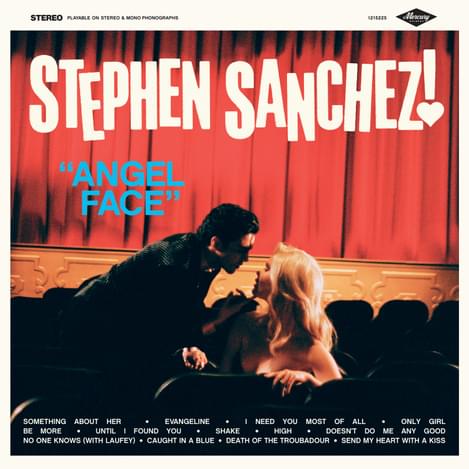Stephen Sanchez gets lost in a nostalgic hue on Angel Face
"Angel Face"

Nashville singer-songwriter Stephen Sanchez is still enamoured with the music of the past and love in all of its colours.
Sanchez seems like an artist who would fit in with the Youth Rebellion era finely. He’s a fierce young man who sings torch songs like there’s nothing else but love in this world. All of his releases so far document romance at all stages, each of which is a slightly altered version of the same story. Marketed as his “debut” album (even though 2022’s Easy on My Eyes is technically an LP), Angel Face circles the narrative of star-crossed lovers once more. Its music harks back to the great artists from early rockabilly: Elvis Presley, Bobby Darin, Jerry Lee Lewis. But how well the execution is remains a question.
A Western epic is what Sanchez intends Angel Face to be. He sets up two characters – one the narrator and the other his partner – in the dawn of a new decade (60s). Instead of exploring the other facets of such a turbulent and significant time in music, everything is always about the teenage love between these protagonists. Even when he is murdered on “Death of the Troubadour”, his last words are a goodbye kiss to the girl. “Though in the ground, my heart for you will stay,” he sings with unwavering determination. It gets a little redundant and exhaustive, leaving plot holes that excite more incredulity than engagement with the story.
The best songs are the ones that lose themselves to the lovesick mania of rock’n’roll and soul, paved by producers Nick Lobel, Ian Fitchuk, and Konrad Snyder, amongst others. “Shake” contains outbursts of piano movements that recall those of Jerry Lee Lewis. “Doesn’t Do Me Any Good”, the absolute peak of Angel Face, fuses subtle soul sensations of the late 60s with Sanchez’s soaring vocals. If anything, his voice has improved drastically since 2021’s EP What Was, Not Now; every spotlight veers towards it whenever he rises upward, boasting his Elvis-coded vibrato. His sense of melody is great – if at times inconsistent and unfitting.
Angel Face casts its anchor on music of the late 50s and early 60s, a time of social tumult and vast musical transitions – and the period when rock’n’roll became the world’s latest obsession. The scope itself is enormous, and Sanchez attempts to merge the sound of those two decades, albeit to no avail. It’s all over the place: there’s a soundtrack ripped off of a Western film (“Death of the Troubadour”), a strange doo-wop song (“Caught in a Blue”), a vintage melodic frenzy (“Shake”). The sonic diversity, for a theme so enveloped in love, doesn’t sit right in a narrative album set in the age of protest. But it opens a door to many plausible pathways; his next big step is to choose wisely.
Get the Best Fit take on the week in music direct to your inbox every Friday

Tunde Adebimpe
Thee Black Boltz

Julien Baker & TORRES
Send A Prayer My Way

Bon Iver
SABLE, fABLE





